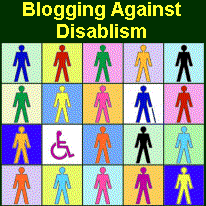I’m enjoying Goldfish’s Invitation for Blogging about disablism
day”.
The good about disability
background: print-disabled and legally blind for five years into retirement.
- I love technology.And, wow, does disability open your eyes, so to speak, or maybe it’s our ears and brains. For example, I carry my entire rebuilt
library of over 1000 DAISY books from bookshare.org on a lavaliere booksense along with many GB of podcasts all downloaded via Levelstar Icon Mobile Manager and Docking station. Better reading now than ever in my life, thanks to this technology and the Internet. - I meet many cool people through my disability. The virtual community of #a11y and #accessibility on Twitter are my gurus and heroes, loading up my browser tabs with good articles and forging new links in my mental map of the field. In physical life, I’m the lady with the white cane to ask about
macular degeneration. - retired and still kicking, my disability + technology background + learning regime have given me a focus for hours a day of accessibility activism as well as outreach. “Turning lemons into lemonade”, they say, but I just call this a lifetime bonus for as long as I can hold it together.
The bad and Other stuff I’m Too Mad To talk about
-
My very own profession sucks at accessibility and supporting disabilities. As a computer science educator, researcher, developer, and manager I followed the trends of not noticing disabilities, and got some immediate karma. You know where all those unaware developers are coming from? Our very own computer science accreditation and technical programs.
And even inexcusably worse are
the leading professional organizations, such as ACM and its decrepit website. Personally, I coughed up $200 for access to a pay wall of articles for my memoirs and on accessibility. A painfully usable digital library interface did not elicit requested help, back channel messages about accessibility problems were ignored, and all I got was a lifetime membership offer and more renewal notices. The ACM motto: “Of course, accessibility is important. But, we don’t know anything about it. Now, please go away”. - If you have or expect a vision problem, don’t move to a place without public transportation! What a difference in my life if only a bus scooted along
the major crosstown connector street a block from my house! I can take taxis when I don’t have regular driver available, can also ask for rides, but the loss of independence is a daily demoralizer. Worse, when I do get out like a regular pedestrian, drivers enter crosswalks to scare me and I know half the drivers are talking or otherwise not paying attention. - Trying to establish new relationships with fuzzy faces is challenging. At least, it’s easier now that I’m out in the open about vision loss compared with prior years of hiding, but it’s still saddening not to know the details of my lifelong learning classmate features. Like everybody around a table is a talking space suit, I struggle to remember names to connect with voices and body outlines. But, at least I’m really working on people connections, finally.
